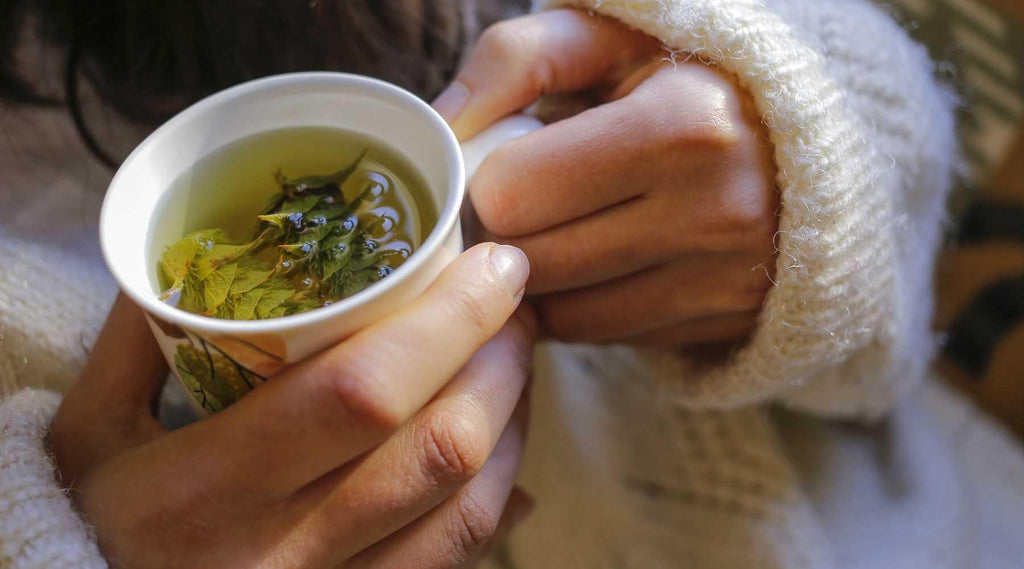
Herbal teas, often known as herbal infusions, have long been enjoyed across the globe. Moreover, they have been used for their health benefits for centuries. In fact, the use of tea as medicine has been traced back thousands of years, to ancient China. Herbal tea use has been growing in popularity in recent years, but what exactly is it and what are the health benefits of herbal tea?
You may be asking though, is tea really relevant when it comes to health and wellbeing in the 21st century? Perhaps you’re curious about what uses it may have or whether there are calories in herbal tea.
Well, you’re in luck! Here, we are taking a closer look at the benefits of herbal tea and answering those very questions. So, keep reading to find out just why you should be adding more tea into your diet. It’s un-tea-leavable!
What is herbal tea?

Contrary to popular belief, herbal teas are not, strictly speaking, teas at all. Genuine tea is made from the leaves of the Camellia sinensis plant. This includes black, green, and oolong teas. The leaves go through different processes to achieve these different results.
Herbal teas, however, are made by infusing dried herbs, fruits, flowers, or spices in boiling water to create tasty - and potentially very beneficial - brews. Naturally caffeine-free, you can enjoy the benefits of herbal tea any time of day or night!
Health benefits of herbal tea

Although many may consider herbal teas as nothing more than enjoyable drinks, numerous studies show there is more to these tisanes ( fancy talk for herbal tea) than you might think. With potential benefits of herbal tea including boosting immunity, lowering cholesterol, aiding digestion, and even preventing certain diseases, there’s a tea for practically everything that ails you. Indeed, there’s plenty of evidence supporting the lasting impacts that drinking herbal teas regularly can have on our health and wellbeing. So, where shall we begin?
Different types of herbal tea and their health benefits
Just as there are several types of true tea, there’s also an enormous variety of herbal teas. These infusions of plant-based ingredients often contain one simple component. However, they can also be found in exciting blends, containing an array of herbs, spices, fruits, and even roots. Naturally, the benefits of herbal tea will vary depending on the properties of each ingredient. Herbs such as peppermint, ginger, and chamomile make frequent appearances, but this is just the tip of the tea-berg! Let’s take a closer look.
Peppermint
A hugely popular choice, peppermint tea has a variety of potential health benefits. In recent years, studies into peppermint derivatives have indicated many possible uses. From easing IBS-related pain to relieving clogged sinuses, research into the compounds found in peppermint is abundant. It’s no wonder that peppermint is so well-loved. Peppermint teas, such as this organic Three Mint blend, are perfect for slowly sipping after a meal! The potential benefits of herbal tea made from peppermint may include:
- Soothing stomach pain
- Relieving headaches
- Increasing concentration
- High levels of antioxidants
- Improved energy levels
Ginger
This one packs a powerful punch! Fiery, invigorating ginger makes a deliciously warming, slightly sweet brew. Ginger, like in this Heath & Heather infusion, is often paired with lemon for an extra zing. Originating from Southeast Asia, ginger has long been used as a home remedy for different ailments. The benefits of herbal tea are strong with this one! It’s packed with healthy, disease-fighting antioxidants and is most commonly used for the relief of nausea. Benefits of ginger may include:
- Immune-boosting properties
- Period pain relief
- Relief of constipation, indigestion, and stomach ulcers
- Blood sugar control, potentially beneficial for those with diabetes
Chamomile
These small, delicate flowers are dried to make herbal tea. There are two varieties commonly chosen for consumption - German and Roman. Used for thousands of years as a natural remedy for a huge range of complaints, it makes a floral, sweet infusion. With its soothing aroma, chamomile tea is a wonderful addition to your tea rotation, if you’re looking to enjoy the benefits of herbal tea. It works beautifully with fennel and oat flowers in this organic offering from Pukka. Here are some potential benefits of chamomile:
- Lowers blood sugar levels in diabetics
- May offer prevention against specific types of cancer
- Reduces inflammation in the body
- Alleviates post-natal depression
- Improves quality of sleep
Rooibos
Grown in the Western Cape region of South Africa, there are two main varieties of rooibos. The first, more commonly used variety consists of fermented leaves, with the reddish-brown hue the tea is known for. The other is green rooibos. This one is not fermented and contains higher levels of antioxidants. It has a mild, earthy flavour with a natural sweetness and is often partnered with other ingredients for extra elements of flavour. It’s a wonderful match with vanilla, as demonstrated by Tick Tock Teas. Some of the possible benefits of herbal tea consisting of rooibos include:
- Balancing “good” and “bad” cholesterol
- Potential anti-diabetic effects
- Boosting heart health
- Helping to maintain bone health
Echinacea
Used for centuries by Native Americans, echinacea tea is made by infusing the flowers, leaves, and roots of the three main types of the echinacea plant. A refreshing, heavily floral tea, it is as delicious as it is healthy, packed with antioxidants! It’s most widely considered for its effects on the immune system and is often blended with other ingredients such as raspberry, elderberry, or peppermint, as it is in these Dr Stuart’s Echinacea Plus Tea Bags. The benefits of herbal tea made from the echinacea plant may include:
- Anti-inflammatory properties
- Reduction in feelings of anxiety
- May prevent or shorten the duration and severity of the common cold
Calories in herbal tea
One of the most commonly asked questions in the conversation about the benefits of herbal tea is, “Are there any calories in herbal tea?” Understandably, when you’re introducing something new into your diet it’s important to know the potential impacts on your body. This simple question, luckily, has a very simple answer.
In short, no, there are virtually no calories in the vast majority of herbal teas! The calorie content is so low it is considered insignificant in pure, additive-free herbal teas. However, the addition of plant milk or sweeteners will naturally increase the number of calories in your beverage. To keep this to a minimum and simply reap all the brilliant benefits of herbal tea, try a natural, plant-based sweetener and low-calorie plant milk, such as unsweetened almond. Alternatively, just enjoy it as is!
In short
With a 4000 year history of usage, we’ve only just scratched the surface of the herbal tea topic here. There are so many more benefits of herbal tea that we haven’t discussed but, hopefully, this is enough to convince you to find the beneficial brew for you. With so many different properties and flavours available, you can discover just the right tea for your needs.
Accompanying the increase in studies validating the claims of traditionally used herbal teas, we are seeing the benefits of herbal tea become infinitely clearer. From pain relief through to calming anxiety, improving sleep to boosting energy levels, there really does seem to be a tea for everything.
Beyond all the wonderful health benefits of herbal tea, not a lot beats relaxing with a steaming hot cuppa. Hot drinks aren’t your thing? Many herbal teas are delicious served iced, too! To get the most out of drinking herbal tea, we recommend choosing products made with high-quality ingredients - organic, if possible. Furthermore, be sure to steep for enough time to reap all the benefits of herbal tea. Stick to the minimum time stated on the packet, but leave for longer if you can, even up to fifteen minutes, to garner all the potential value from those salubrious tisanes.
Perhaps it’s true what they say, maybe a cup of tea really can make all our problems better! So, what are you waiting for? Choose the teas for you today and determine how you can make use of the benefits of herbal tea!







